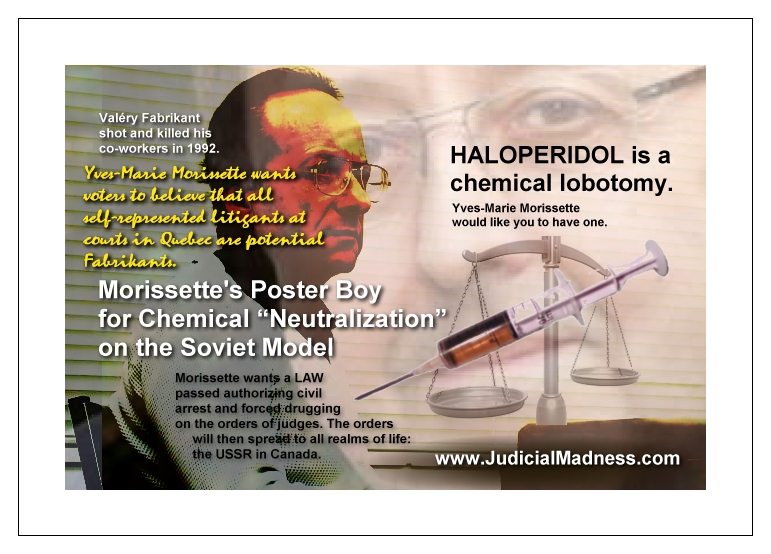Quotations re Habeas Corpus
Quotations from “The ‘Great Writ’ Reinvigorated?” by Debra Parkes
Habeas Corpus for “Other” Forms of Detention
“In Canada, there has also been controversy in recent years about the availability of habeas corpus review and its relationship to other remedies and avenues for judicial review of imprisonment and other forms of detention.”
– Commentary, “The ‘Great Writ’ Reinvigorated?” by Debra Parkes, Associate Professor and Associate Dean (Research & Graduate Studies), Faculty of Law, University of Manitoba, in 2012 36:1 Man LJ 351 @ 351
Habeas Corpus against Mental Health Confinement
The writ of habeas corpus, described by Blackstone as “the great and efficacious writ, in all manner of illegal confinement,” functions as a vehicle to challenge the legality of detention. In the Canadian context, habeas corpus has been available to challenge a wide variety of detentions including those on mental health grounds, in connection with military service, and with respect to extradition.
– Commentary, “The ‘Great Writ’ Reinvigorated?” by Debra Parkes, Associate Professor and Associate Dean (Research & Graduate Studies), Faculty of Law, University of Manitoba, in 2012 36:1 Man LJ 351 @ 352
Writ of Habeas Corpus is Non-Discretionary
Habeas corpus is a potentially powerful remedy in the sense that it is not discretionary. It is distinct from the prerogative writs such as those for certiorari and prohibition in that it issues as of right (and the prisoner should be released) if the detention is determined to be unlawful, provided the applicant is not seeking to subvert or circumvent the normal processes of appeal from conviction.
– Commentary, “The ‘Great Writ’ Reinvigorated?” by Debra Parkes, Associate Professor and Associate Dean (Research & Graduate Studies), Faculty of Law, University of Manitoba, in 2012 36:1 Man LJ 351 @ 352-353
Writ of Habeas Corpus can “Fill Gaps” in Statutory Regimes
The extent to which courts were (and are) willing to use the writ of habeas corpus to fill gaps in rights protection left by these various statutory regimes continues to be an important question in Canadian law.
– Commentary, “The ‘Great Writ’ Reinvigorated?” by Debra Parkes, Associate Professor and Associate Dean (Research & Graduate Studies), Faculty of Law, University of Manitoba, in 2012 36:1 Man LJ 351 @ 352-353
Habeas Corpus one of Citizen’s “Most Fundamental” Rights
At the same time as the Miller trilogy was winding its way to the Supreme Court, the Canadian Charter of Rights and Freedoms was enacted, with section 10 providing that “[e]veryone has the right on arrest or detention… (c) to have the validity of the detention determined by way of habeas corpus and to be released if the detention is not lawful.” In applying section 10(c) in R v Gamble, the Supreme Court emphasized the flexible nature of the habeas corpus remedy and warned against “plac[ing] procedural roadblocks in the way of someone like the appellant who is seeking to vindicate one of the citizens’ most fundamental rights in the traditional and appropriate forum.”
– Commentary, “The ‘Great Writ’ Reinvigorated?” by Debra Parkes, Associate Professor and Associate Dean (Research & Graduate Studies), Faculty of Law, University of Manitoba, in 2012 36:1 Man LJ 351 @ 354-355
“Great Abuse” and “Great Illegality” Require Habeas Corpus
Yet the appellate courts held that courts should decline to exercise their habeas corpus jurisdiction on the basis that the internal prison grievance system and/or judicial review in the Federal Court amounted to “a complete, comprehensive and expert procedure for review of a decision affecting the prisoner’s confinement.” These courts were treating habeas corpus as a discretionary remedy, and were assuming that the alternatives open to prisoners (particularly the internal grievance procedure, followed by judicial review proceedings in Federal Court) provided adequate and timely justice. These assumptions were challenged successfully in May v Ferndale Institution, a case which provided the Supreme Court with an opportunity to clarify its comments in Steele and to affirm the importance of habeas corpus review in the prison context where, as I and others have argued elsewhere, the potential for abuse and illegality is great and the need for judicial oversight is particularly acute.
– Commentary, “The ‘Great Writ’ Reinvigorated?” by Debra Parkes, Associate Professor and Associate Dean (Research & Graduate Studies), Faculty of Law, University of Manitoba, in 2012 36:1 Man LJ 351 @ 356
Potential for “Automatic Reclassification” of Plaideur Vexatoire to Quérulent“
Terry May and other prisoners were serving life sentences in a federal prison when they were automatically reclassified from minimum to medium security and involuntarily transferred to a higher security prison. Their reclassification was due to a change in policy whereby completion of a certain anti-violence program was required to maintain minimum security status. They applied to the British Columbia Supreme Court for habeas corpus review, with certiorari in aid, arguing that the reclassification decision was arbitrary and that they were denied procedural fairness since the Correctional Service had failed to disclose the scoring matrix used to reclassify them. [...] the Supreme Court [...] strongly affirmed the availability of habeas corpus review in provincial superior courts in these and other circumstances involving the residual liberty interests of prisoners [...]
– Commentary, “The ‘Great Writ’ Reinvigorated?” by Debra Parkes, Associate Professor and Associate Dean (Research & Graduate Studies), Faculty of Law, University of Manitoba, in 2012 36:1 Man LJ 351 @ 357
Habeas Corpus a “Critical Check” on Government Power
Access to the courts to review the legality of detention is a critical check on government power in these times of political expediency in the name of law and order and national security.
– Commentary, “The ‘Great Writ’ Reinvigorated?” by Debra Parkes, Associate Professor and Associate Dean (Research & Graduate Studies), Faculty of Law, University of Manitoba, in 2012 36:1 Man LJ 351 @ 359
“Principle” of Habeas Corpus Access Affirmed by Federal Charter
In Charkaoui v Canada, Chief Justice McLachlin made it clear that “foreign nationals, like others, have a right to prompt review to ensure that their detention complies with the law. This principle is affirmed in section 10(c) of the Charter. [...] In these and other contexts, it is hoped that the flexibility and gap-filling functions of the habeas corpus remedy will continue to develop in a manner deserving of the “great writ of liberty.”
– Commentary, “The ‘Great Writ’ Reinvigorated?” by Debra Parkes, Associate Professor and Associate Dean (Research & Graduate Studies), Faculty of Law, University of Manitoba, in 2012 36:1 Man LJ 351 @ 360




